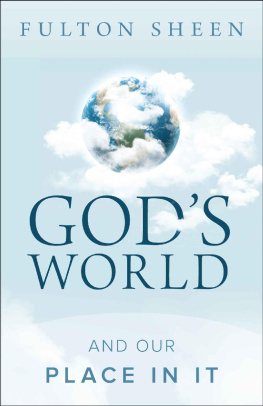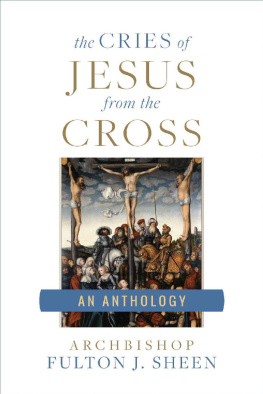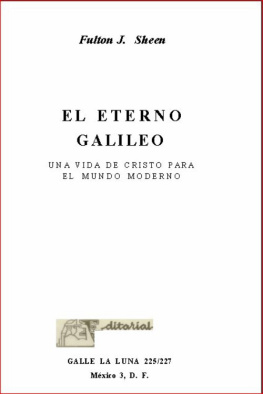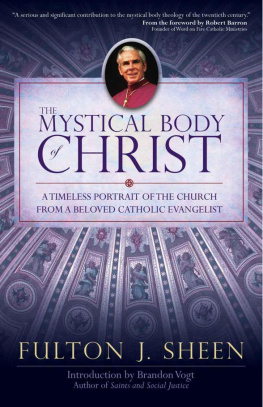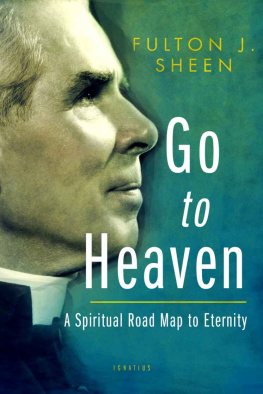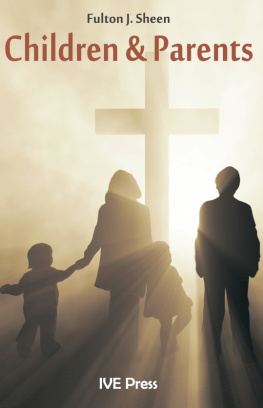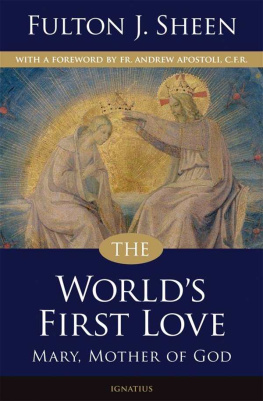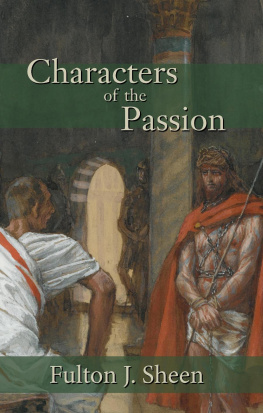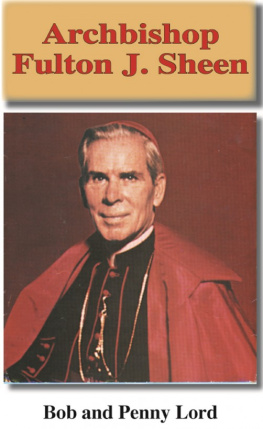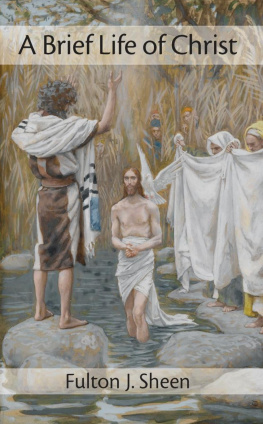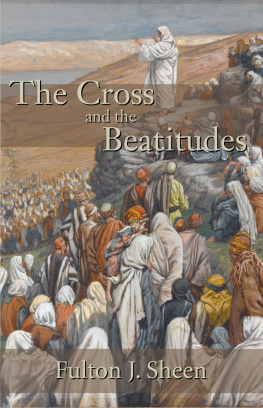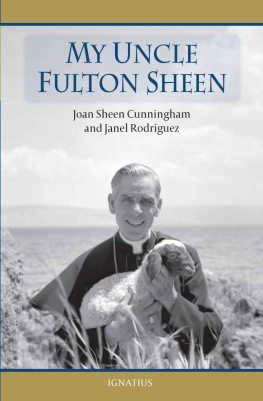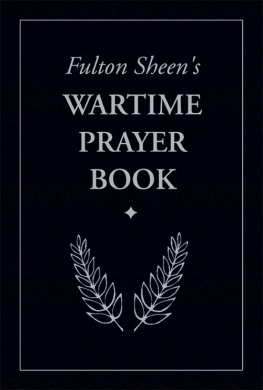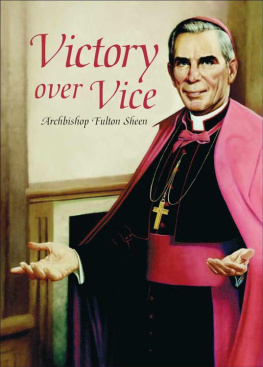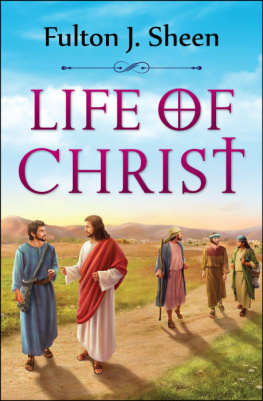Fulton J. Sheen - Gods World and Our Place in It
Here you can read online Fulton J. Sheen - Gods World and Our Place in It full text of the book (entire story) in english for free. Download pdf and epub, get meaning, cover and reviews about this ebook. year: 2013, publisher: Sophia Institute Press, genre: Science. Description of the work, (preface) as well as reviews are available. Best literature library LitArk.com created for fans of good reading and offers a wide selection of genres:
Romance novel
Science fiction
Adventure
Detective
Science
History
Home and family
Prose
Art
Politics
Computer
Non-fiction
Religion
Business
Children
Humor
Choose a favorite category and find really read worthwhile books. Enjoy immersion in the world of imagination, feel the emotions of the characters or learn something new for yourself, make an fascinating discovery.
- Book:Gods World and Our Place in It
- Author:
- Publisher:Sophia Institute Press
- Genre:
- Year:2013
- Rating:3 / 5
- Favourites:Add to favourites
- Your mark:
- 60
- 1
- 2
- 3
- 4
- 5
Gods World and Our Place in It: summary, description and annotation
We offer to read an annotation, description, summary or preface (depends on what the author of the book "Gods World and Our Place in It" wrote himself). If you haven't found the necessary information about the book — write in the comments, we will try to find it.
Gods World and Our Place in It — read online for free the complete book (whole text) full work
Below is the text of the book, divided by pages. System saving the place of the last page read, allows you to conveniently read the book "Gods World and Our Place in It" online for free, without having to search again every time where you left off. Put a bookmark, and you can go to the page where you finished reading at any time.
Font size:
Interval:
Bookmark:
Gods World and Our Place in It
Fulton J. Sheen
SOPHIA INSTITUTE PRESS
Manchester, New Hampshire
Gods World and Our Place in It was originally published as The Moral Universe: A Preface to Christian Living (Milwaukee: The Bruce Publishing Company, 1936). This 2003 edition by Sophia Institute Press contains minor editorial revisions to the original text.
Copyright 2003 Sophia Institute Press
Printed in the United States of America
All rights reserved
Cover design by Lorraine Bilodeau
Cover image Copyright George B. Diebold/Corbis
No part of this book may be reproduced, stored in a retrieval system, or transmitted in any form, or by any means, electronic, mechanical, photocopying, or otherwise, without the prior written permission of the publisher, except by a reviewer, who may quote brief passages in a review.
Sophia Institute Press
Box 5284, Manchester, NH 03108
1-800-888-9344
www.SophiaInstitute.com

Nihil obstat:
H. B. Ries,
Censor Librorum

Imprimatur:
Samuel A. Stritch,
Archbishop of Milwaukee
March 30, 1936
241.042 dc212002153437
Dedicated to the Blessed Mother in token of love and gratitude
Editors note: The biblical quotations in the following pages are taken from the Douay-Rheims edition of the Old and New Testaments. Where applicable, quotations have been cross-referenced with the differing names and enumeration in the Revised Standard Version, using the following symbol: (RSV =).
Chapter One

God dwells in humility in His world
Every artist has the feeling of being at home in his studio, every patriot at home in his own country, and every man at home in his house. One should therefore expect that the Creator would be at home in His own creation, and that God would be at home in the world He had made. And yet the most startling fact of human history is that when God came to earth, He was homeless at home. He came unto His own, and His own received Him not.
There was room in the inn for those who bore on their breasts the screaming eagles of Rome; there was room for the daughters of the rich merchants of the East; there was room for all clothed in fine purple and soft garments; there was room for everyone except the foster-father and the mother of the One who was to bring redemption to the world.
And so, away from the inn and out to the stable they had to go, to a crude cave into which shepherds drove their flocks in storms. In that little haven, with manger beasts as companions, and at a central point between the three great civilizations of Memphis, Athens, and Rome, something happened the only thing in the world that ever happened and mattered. That which happened was nothing less than Heaven being found on the earth as the cry of a God cried out in the cry of a Child.
A startling paradox indeed: When God came to earth, there was no room in the inn, but there was room in the stable. What lesson is hidden behind the inn and the stable?
What is an inn, but the gathering-place of public opinion, the focal point of the worlds moods, the residence of the worldly, the rallying place of the fashionable and those who count in the management of the worlds affairs? What is a stable, but the place of outcasts, the refuge of beasts, and the shelter of the valueless, and therefore the symbol of those who in the eyes of public opinion do not count, and hence may be ignored as of no great value or moment? Anyone in the world would have expected to have found Divinity in an inn, but no one would have expected to have found it in a stable. Divinity, therefore, is always where you least expect to find it.
If, in those days, the stars of the heavens by some magic touch had folded themselves together as silver words and announced the birth of the Expected of the Nations, where would the world have gone in search of Him?
The world would have searched for the Babe in some palace by the Tiber, or in some gilded house of Athens, or in some inn of a great city where gathered the rich, the mighty, and the powerful ones of earth. They would not have been the least surprised to have found the newborn King of kings stretched out on a cradle of gold and surrounded by kings and philosophers paying to Him their tribute and obeisance.
But they would have been surprised to have discovered Him in a manger, laid on coarse straw and warmed by the breath of oxen, as if in atonement for the coldness of the hearts of men. No one would have expected that the One whose fingers could stop the turning of Arcturus would be smaller than the head of an ox; that He who could hurl the ball of fire into the heavens would one day be warmed by the breath of beasts; that He who could make a canopy of stars would be shielded from a stormy sky by the roof of a stable; or that He who made the earth as His future home would be homeless at home. No one would have expected to find Divinity in such a condition; but that is because Divinity is always where you least expect to find it.

The world still doesnt know where to find God
I wonder if that is not the reason why the modern world misses the discovery of Divinity. There is no doubt that it is seeking Divinity if for no other reason than because it feels its own insufficiency and craves a God who will bring pardon for its sins and healing oil for its wounds. It seeks a Divinity who will deliver it from the terrible restlessness and emptiness of life. But where does it seek that Divinity? It seeks it in the inns where gather the publicized, the propagandized, the popular, and the modern.
The modern world looks for Divinity and the solution of its ills in the Superman of H. G. Wells, in the Humanism of Irving Babbitt, in the Sexualism of Sigmund Freud, in the Cynicism of Bertrand Russell, in the naturalism of modern religion, in the book of the month, in the reinterpreted Christ, in the new morals, in the new psychology, in the new science; but in none of these inns is Divinity to be found. As it was not in the inn in the first century, so it shall not be found in the inn of the current century, for what is true of the first day is true of our own: Divinity is always where you least expect to find It.
Suppose now that it was suggested to the modern world that the Divinity it seeks is to be found in the Church; suppose that it was hinted to all who are seeking for Divinity that the truth it craves is to be found only in the Vicar of Christ, who, as another Peter, articulates the mind of Christ; that the Divine Life for which it yearns is to be found only in the seven-branched fountain of the sacraments; that the pardon it begs drops from an uplifted hand in the confessional; that only in the Churchs attitude toward marriage can our national fabric be preserved; and only in the Churchs morality can personal virtue be regained.
Suppose that the modern world today was told that Bethlehem continued to our own day that, by some great miracle of Gods love, the stable is now the tabernacle; the manger is now the ciborium; the straw is now the altar flowers; the swaddling bands are now the white species of bread and that the Body and Blood, Soul and Divinity of Christ is living among us in that tabernacle just as really and truly as in the crib.
Next pageFont size:
Interval:
Bookmark:
Similar books «Gods World and Our Place in It»
Look at similar books to Gods World and Our Place in It. We have selected literature similar in name and meaning in the hope of providing readers with more options to find new, interesting, not yet read works.
Discussion, reviews of the book Gods World and Our Place in It and just readers' own opinions. Leave your comments, write what you think about the work, its meaning or the main characters. Specify what exactly you liked and what you didn't like, and why you think so.

